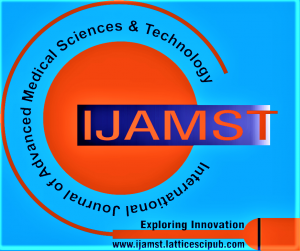![]()
Mediating Health and Risk Information in WhatsApp and its Impact on Risk Perception and Risk Knowledge During COVID-19 Public Health Emergency
Varghese Riju Joshua1, Anand Lenin Vethanayagam2
1Varghese Riju Joshua, Department of Mass Communication, University of Technology and Applied Sciences, Nizwa, Al Dakhiliyah, Oman.
2Dr. S. Anand Lenin Vethanayagam, Department of Electronic Media and Mass Communication, University of Technology and Applied Sciences, Nizwa, Al Dakhiliyah, Oman.
Manuscript received on 22 May 2023 | Revised Manuscript received on 05 June 2023 | Manuscript Accepted on 15 June 2023 | Manuscript published on 30 June 2023 | PP: 1-6 | Volume-3 Issue-4 June 2023 | Retrieval Number: 100.1/ijamst.D3035063423 | DOI: 10.54105/ijamst.D3035.063423
Open Access | Editorial and Publishing Policies | Cite | Zenodo | Indexing and Abstracting
© The Authors. Published by Lattice Science Publication (LSP). This is an open access article under the CC-BY-NC-ND license (http://creativecommons.org/licenses/by-nc-nd/4.0/)
Abstract: WhatsApp is India’s most popular social media application and has emerged as a valuable tool for health and risk communication during the COVID-19 public health emergency (PHE). Public health institutions, WHO and Government agencies used WhatsApp Health Alert to distribute verified, accurate and timely information during the COVID-19 pandemic. This study examines the potential of WhatsApp as a primary source of health and risk information and its impact on users’ risk knowledge and risk perception during the COVID-19 pandemic. We conducted a cross-sectional online survey among 453WhatsApp users in Tamil Nadu during the COVID-19 lockdown in May-August 2021. Most of the respondents used WhatsApp as the primary source of COVID-19 information than other media. COVID-19 information in WhatsApp had a positive and significant impact on users’ risk knowledge and risk perception. Regularly receiving and sharing COVID-19 information, subscribing to and participating in COVID-19-related group chats, and regularly updating WhatsApp statuses about COVID-19 were significant influencers of risk knowledge and risk perception. Future PHE response communication must build on these communication opportunities in WhatsApp rather than routed primarily to traditional methods.
Keywords: Health information, Risk knowledge, Risk perception, COVID-19, Public Health Emergency (PHE), WhatsApp
Scope of the Article: Health Improvement Strategies
